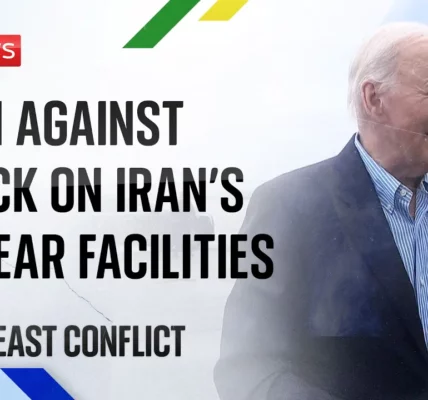US Military Readiness in the Middle East: Defense of Israel Against Iranian Threats

This article provides an in-depth overview of the current military activities and strategies of the United States in the Middle East, highlighting the defense of Israel amid threats from Iran and its affiliates, as well as updates on disaster response efforts from Hurricane Helen.
Introduction
The geopolitical climate in the Middle East remains fraught with tension, particularly due to the aggressive posturing of Iran and its proxy groups. Recent missile attacks aimed at Israel have necessitated a robust response from the United States, which has positioned naval destroyers in the region to safeguard American personnel and support Israeli defense efforts. This article delves into the details of these military engagements, the discussions between US and Israeli officials, and the implications for regional stability.
Military Engagements and Responses
The United States has maintained a strong military presence in the Middle East to deter threats from Iran and its associated terrorist organizations. Recent events have brought this strategy to the forefront.
Missile Interceptions by US Navy Destroyers
Two Navy destroyers, the USS Bulkley and the USS Cole, played crucial roles in intercepting missiles launched from Iran. The interception involved the deployment of approximately a dozen missiles aimed at neutralizing the incoming threats.
Communication Between US and Israeli Officials
Ongoing consultations between Secretary of Defense Austin and Israeli Defense Minister Gantz are critical in managing the situation. Key discussions focus on:
- Strategies to de-escalate tensions.
- Support for Israel’s right to defend itself against Iranian aggression.
- Plans for future military operations if required.
Current Threat Assessments
Despite the successful interceptions, US officials remain vigilant regarding potential further attacks from Iran. The US has established a clear stance: any targeting of American personnel or interests will be met with decisive action.
Regional Stability and the Risk of Wider Conflict
The risk of a broader regional conflict remains a concern for US and Israeli officials.
Understanding Iranian Intentions
Iran’s missile capabilities and its willingness to employ them pose a significant threat. Recent attacks have demonstrated that:
- Iran has the capability to launch large-scale missile attacks.
- Missiles were predominantly launched from within Iran’s borders.
- The US and Israel are prepared to respond should further escalations occur.
Support for Israeli Operations Against Hezbollah
The US has expressed support for Israel’s operations against Hezbollah along the Israel-Lebanon border, understanding the necessity of dismantling infrastructure used for attacks. This includes:
- Monitoring Hezbollah activities.
- Ensuring that military actions do not escalate into a wider conflict.
- Facilitating diplomatic solutions to maintain stability.
Updates on Hurricane Helen Response Efforts
In addition to military concerns, the Department of Defense is actively engaged in response efforts to Hurricane Helen, which has impacted multiple states. Key points include:
Deployment of National Guard Units
Over 6,500 service members are currently involved in relief efforts, with significant deployments in:
- Florida: Nearly 3,500 Guardsmen activated.
- Georgia: Approximately 1,400 Guardsmen on duty.
- North Carolina: Focused efforts on recovery from historical flooding.
Cooperation with Federal and Local Agencies
The DOD is coordinating with various agencies to ensure a comprehensive response, including:
- Providing emergency power and logistical support.
- Conducting damage assessments and recovery operations.
- Ensuring safety and resources for affected communities.
Conclusion
The current situation in the Middle East highlights the complexities of geopolitical tensions involving the United States, Israel, and Iran. The steadfast readiness of the US military to defend its personnel and support allied nations is crucial in maintaining regional stability. As military actions unfold and the response to Hurricane Helen continues, the commitment to both defense and humanitarian efforts remains a priority.
For further insights into US military operations and disaster response strategies, please explore our related articles on regional security and emergency management.
“`




